In_equality
Conference
2026
Save the Date: In_equality Conference 2026
15-17 April 2026
Bodenseeforum Konstanz & online
The In_equality Conference 2026 is dedicated to exploring the political causes and consequences of inequality across various dimensions and empirical domains.
The conference addresses questions in empirical domains including education, labor markets, health care, minority and language rights, and climate change.
We are delighted to announce that the following keynote speakers have been confirmed: Silja Häusermann (University of Zurich), Merlin Schaeffer (University of Copenhagen), Emma S. Spiro (University of Washington), and Attila Lindner (University College London).
Call for Papers is now closed:
We are excited to share that we have received over 600 submissions from scholars around the world.
Due to the high number of contributions, the selection process will continue until mid-December. We appreciate your patience as we carefully conduct the review to ensure a diverse and high-quality program.
Conference format:
The conference will be organized as a climate friendly conference, focusing on reducing and avoiding CO2 emissions wherever possible.
In-person event for presenters with digital / hybrid option for further attendees. All sessions, talks, and discussions will be live-streamed.
Talks in multiple moderated panels plus “Satellite”-panels’ on cross-cutting topics.
There will also be an opportunity for poster presentations, allowing
participants to showcase their research visually and interact with attendees.
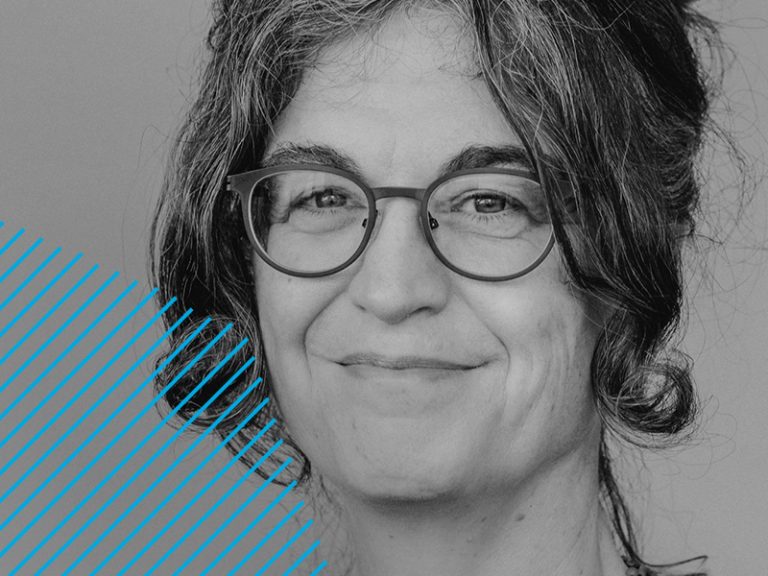
Claudia Diehl
University of Konstanz
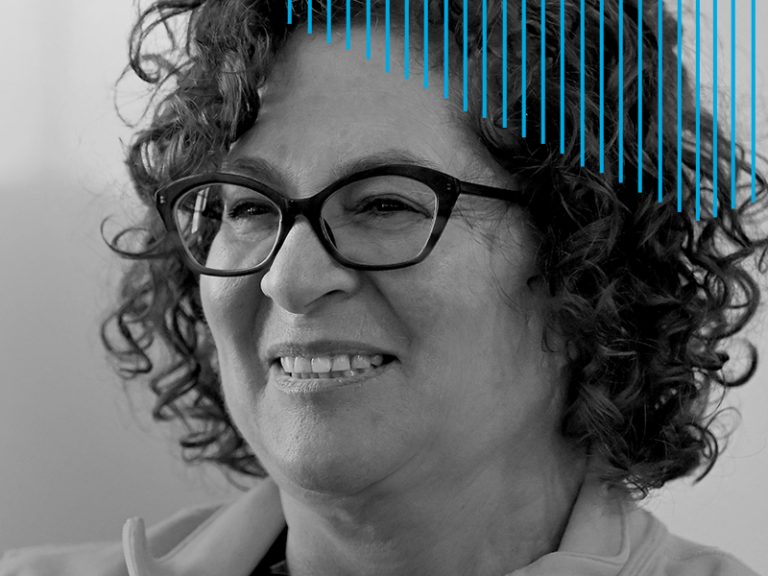
Maria Polinsky
University of Maryland
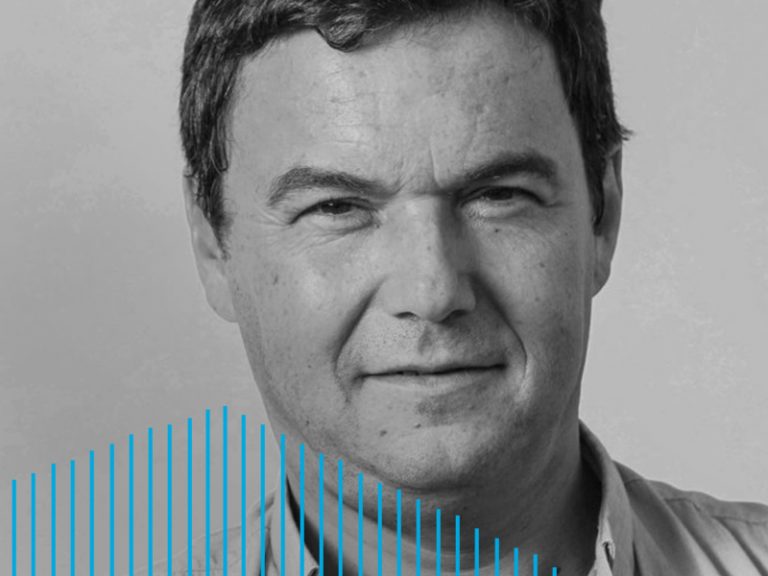
Thomas Piketty
EHESS/Paris School of Economics
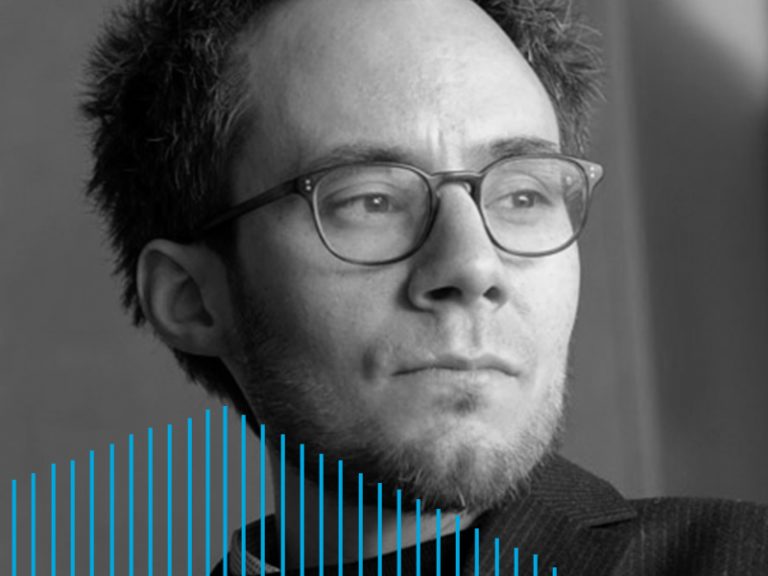
Joscha Legewie
Harvard University
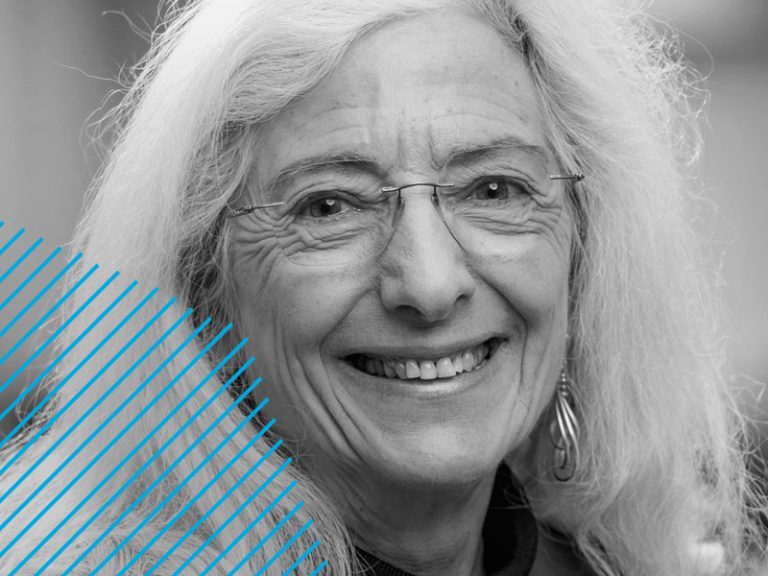
Evelyne Huber
University of North Carolina
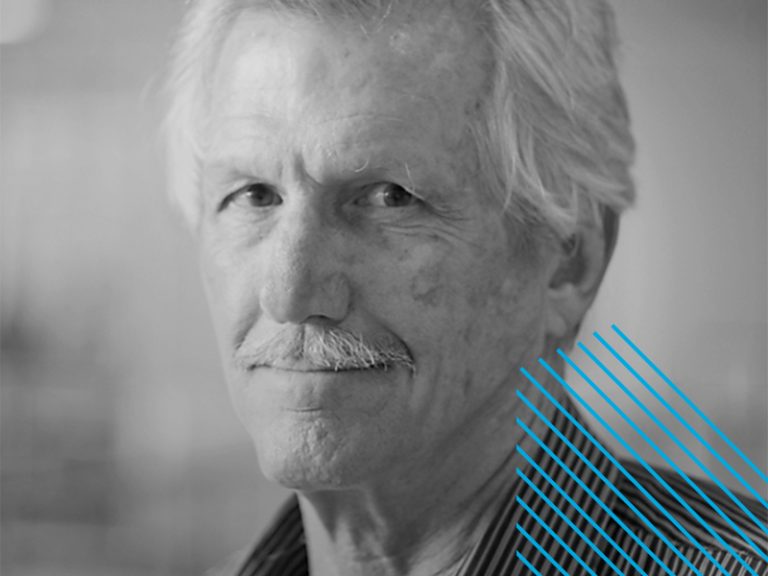
John D. Stephens
University of North Carolina
Registration
Registration for In_equality 2024 is open: Register now. Please note: in order to participate in the Conference (on site or online), registration is mandatory.
Registration for on-site participation will be open until 10 March. You may register for online participation until 30 March.
We use ConfTool to handle registrations and tickets. Find the available pricings below (Conference fee must be paid by all participants).
- Full Price 130 €
participation on site in Konstanz - closed
- Reduced Price 60 €
closed
- Online Participation 0 €
online only
Program 2024
The full program may be downloaded (PDF) here.
We are happy to present you fine presentations, workshops and keynotes with leading scientists of inequality research and an exciting supporting program around Constance over three days.
Panel 1 – Minorities (Plenary Hall)
Panel 1 – Minorities
(Plenary Hall)
Panel 2 – Redistribution I (Room 2)
Panel 2 – Redistribution I
(Room 2)
Panel 3 – Public Opinion and Ideology (Room 3)
Panel 3 – Public Opinion and Ideology (Room 3)
Panel 4 – Working Conditions and Social Policy (Room 4)
Panel 4 – Working Conditions and Social Policy (Room 4)
Panel 1 – Minorities
(Plenary Hall)
Panel 2 – Redistribution I
(Room 2)
Panel 3 – Public Opinion and Ideology (Room 3)
Panel 4 – Working Conditions and Social Policy (Room 4)
Who deserves to be treated with (more) respect? Using Language as an Indicator of Behavior to Understand Deservingness Preferences
Income inequality and political trust: the effect of relative income position and persistence
How Do Migrants in Germany Judge Economic Inequality?
Dare to borrow? Mortgage Behaviour as a Microfoundation of Housing Financialization and Wealth Inequality in China
Pushed to the limit: Do droughts intensify socio-environmental inequalities in Peruvian mining communities?
Green Transition or Digitalization? Individual-level Preferences over Public Spending Trade-offs
Panel 5 – Political Parties and Voting Behavior (Plenary Hall)
Panel 6 – Redistribution II
(Room 2)
Panel 7 – Discourse and Representation (Room 3)
Satellite Programme I (WSI) – Pandemic & Inequality (Room 4)
Panel 5 – Political Parties and Voting Behavior (Plenary Hall)
Panel 6 – Redistribution II
(Room 2)
Panel 7 – Discourse and Representation (Room 3)
Satellite Programme I (WSI) – Pandemic & Inequality (Room 4)
Satellite Programme II – Bertelsmann-Stiftung (Plenary Hall)
Panel 8 – Unions
(Room 2)
Panel 9 – Early-Life Inequality
(Room 3)
Panel 10 – Mobilizing Inequality
(Room 4)
Satellite Programme II – Bertelsmann-Stiftung (Plenary Hall)
Panel 8 – Unions
(Room 2)
Panel 9 – Early-Life Inequality
(Room 3)
Panel 10 – Mobilizing Inequality
(Room 4)
Panel 11 – Regional Divides
(Plenary Hall)
Panel 12 – Intergenerational Mobility (Room 2)
Panel 13 – Gender
(Room 3)
Panel 14 – Fairness and Opportunity (Room 4)
Panel 11 – Regional Divides
(Plenary Hall)
Panel 12 – Intergenerational Mobility (Room 2)
Panel 13 – Gender
(Room 3)
Panel 14 – Fairness and Opportunity (Room 4)
Panel 15 – Global Inequalities I
(Plenary Hall)
Panel 16 – Wealth
(Room 2)
Panel 17 – Education and Migration I (Room 3)
Satellite Programme III – DIW Berlin (Room 4)
Panel 15 – Global Inequalities I
(Plenary Hall)
Panel 16 – Wealth
(Room 2)
Panel 17 – Education and Migration I (Room 3)
Satellite Programme III – DIW Berlin (Room 4)
Can climate adaptation aid mitigate global inequalities by saving lives? Sub-national evidence from a quasi-experiment of tropical storms in the Philippines
Discrimination is not a matter of accent: The Sámi in Sweden and Norway
Does information about economic inequality affect opportunity beliefs? Results from survey experiments
Institutional and macro-economic drivers affecting wage inequality across Europe
Is English an inequitable language?
Language at War: how the status of Russian-Ukrainian language inequality changes during the Russian invasion of Ukraine
Perceived income inequality, preceived unfairness and subjective social status in Europe
Role models among us: experimental evidence on inspirational and gender disparities set in stones
Types of Inequality: What Matters to Who?
Satellite Programme IV – Open Science (Plenary Hall)
Panel 18 – Perceptions of Income and Inequality (Room 2)
Panel 19 – (Un)employment
(Room 3)
Panel 20 – Global Inequalities II
(Room 4)
Satellite Programme IV – Open Science (Plenary Hall)
Panel 18 – Perceptions of Income and Inequality (Room 2)
Panel 19 – (Un)employment
(Room 3)
Panel 20 – Global Inequalities II
(Room 4)
Satellite Programme V – Global South (Plenary Hall)
Panel 21 – Taxation
(Room 2)
Panel 22 – Education and Migration II (Room 3)
Panel 23 – Administrative Inequality (Room 4)
Satellite Programme V – Global South (Plenary Hall)
Panel 21 – Taxation
(Room 2)
Panel 22 – Education and Migration II (Room 3)
Panel 23 – Administrative Inequality (Room 4)
Panel 24 – Climate Change
(Plenary Hall)
Panel 25 – Technology
(Room 2)
Panel 26 – Inequality at Work
(Room 3)
Panel 27 – Political Trust
(Room 4)
Panel 24 – Climate Change
(Plenary Hall)
Panel 25 – Technology
(Room 2)
Panel 26 – Inequality at Work
(Room 3)
Panel 27 – Political Trust
(Room 4)
Location
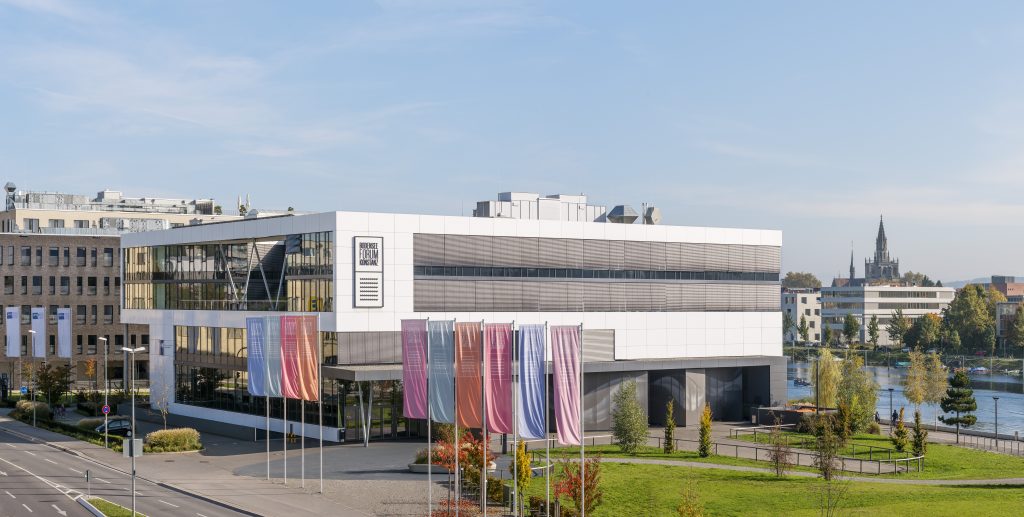
On-Site Location
Bodenseeforum Konstanz
Reichenaustr. 21
D-78467 Konstanz, Germany
(image: Guido Kasper)
The City of Konstanz
Konstanz itself is certainly worth a trip. The picturesque town is the largest city in the four-country region of Lake Constance, where Germany, Switzerland, Austria and Liechtenstein meet. Konstanz dates back to Roman times and is located in the very south of Germany, directly on the Swiss border. It is home to our University of Konstanz as well as a University of Applied Sciences, the HTWG.
The historic old town is especially worth seeing and invites you to stroll and linger. Make sure to also have a look at our landmark, the Imperia statue at the Harbour, and enjoy the many beautiful views of the lake and (in clear weather) the Swiss Alps.
(image credits: F. Bucher under creative commons)
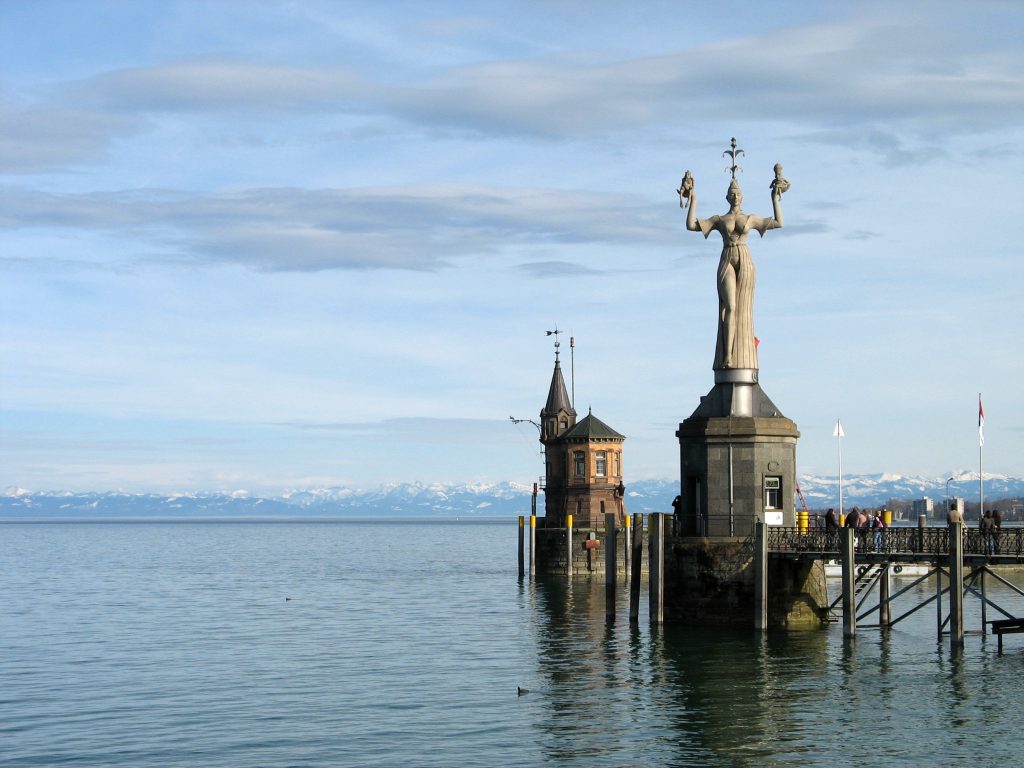
Social Event
What would a conference be without opportunities to chat up any of our speakers, talk and mingle? Aside from much-needed coffee and lunch breaks, we are planning a conference dinner on the beautiful Isle of Mainau. And since visiting Lake Constance without getting to see it up close would be a shame, we are going to travel to the island in style: by boat.
(image credits: Insel Mainau/Achim Mende)
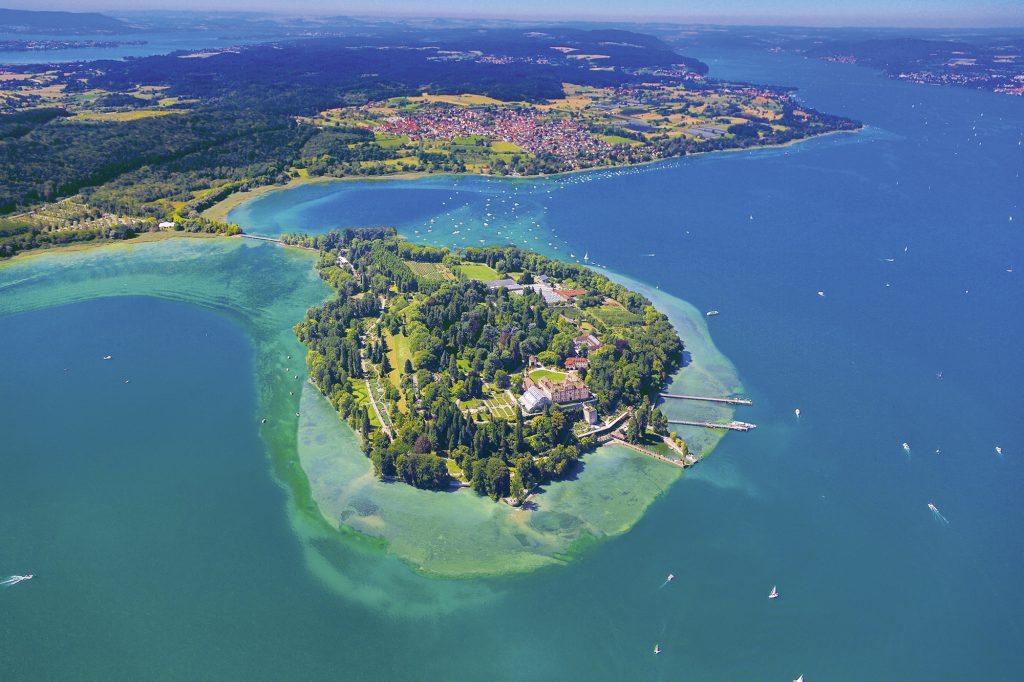
Things to do in Konstanz
For some time out, Konstanz invites you to stroll and linger. The promenade along the shore of the Seerhein, starting directly at the Bodenseeforum, is wonderful for a walk. Countless public places to linger by the water and the park by the bicycle bridge offer plenty of space for leisure.
From there, you can also walk the “Seestraße” along Lake Constance if you want to go for a longer walk. There are also cafes on the way, for a drink on the go and banks to linger in.
If you arrive a day earlier or are still staying in Constance and would like to make an excursion, a trip to Meersburg is a good idea. Here you can take the ferry from Constance and already enjoy the way there. Meersburg offers many places to eat and drink. It is especially nice to walk along the promenade or to go to the state wine estate, which sells its own wine. The winery is situated higher up on a small mountain, so you have a beautiful view over the lake when you sit outside.
Bars and Restaurants
As the pulsating centre of the four-country region of Lake Constance, Constance offers many locations for night owls and connoisseurs: from traditional wine taverns and secluded beer gardens to cosy bars, cafés and pubs, there is something for everyone here.
The historic old town, together with the Niederburg, are good places to go: beer lovers will find the “Joh. Albrecht brewery”, the “Constanzer Wirtshaus”, the “Brauerei Ruppaner”, the “Bierboutique” and the “Hafenhalle”. The breweries are also good places to eat. For wine lovers, on the other hand, there are several wine taverns in the old town, e.g. “Zur Steinernen Kugel” in Hohenhausgasse or the “Weinstube Niederburg“. Among young people, the “Heimat“, “Destille” or the “Klimperkasten” are also popular bars. The “Blaue Engel” is recommended as a cocktail bar.
Konstanz also has a lot to offer in the way of culinary delights. In the immediate vicinity of the Bodenseeforum is the “Friedrichs“. Refreshingly different is the restaurant with terrace directly on the Seerhein promenade with a view of the water and the old town. In the evening, gourmets can be surprised here with modern, regional and seasonal dishes.
The restaurant “Konzil” offers Baden cuisine with historic halls as well as a lakeside terrace with a view of the harbour, lake and the landmark of the city of Constance, the Imperia.
French cuisine can be found at the “Brasserie Colette Tim Raue“. Berlin star chef Tim Raue is a firm gastronomic fixture in the Lake Constance region. Young and old enjoy French classics here as well as dishes from the weekly changing lunch menu.
If, on the other hand, you are looking for a place to have breakfast or brunch, the “Stadtkind” in the Paradies district or the “Cafe Auszeit” are ideal.
In_equality Research Award 2024 for Simon Jäger
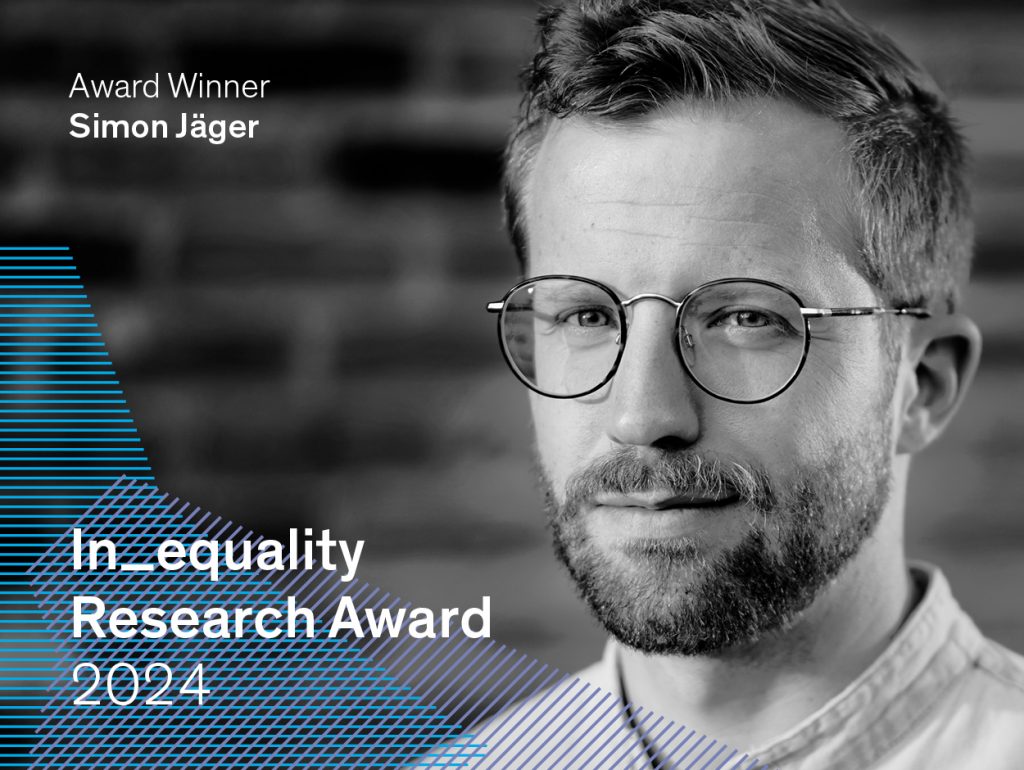
The In_equality Research Award honours exceptional research achievements with a large social impact and significant contributions to improving social systems. The Cluster of Excellence “The Politics of Inequality” at the University of Konstanz presents the 2024 award to renowned economist Simon Jäger who studies the origins and consequences of inequality in the labour market as well as the influence of institutions on social and economic participation. In his research, Simon Jäger was able to show how psychological factors can cause poverty traps in the labour market.
Marius R. Busemeyer, speaker of the Cluster of Excellence and a member of the award committee, explains: “Our aim is to promote courageous research on inequality that simultaneously initiates social change processes. Our award winner, Simon Jäger, is committed to precisely this goal in his research and understanding of knowledge transfer”.
Simon Jäger is a professor at the Massachusetts Institute of Technology (MIT), where he also holds the Silverman (1968) Career Development Chair. In addition, he is a research fellow at the National Bureau of Economic Research (NBER) and other leading research institutions. Since February 2024, he has been advising the Federal Ministry for Economic Affairs and Climate Action (BMWK) led by Robert Habeck. “I am very honoured to receive the In_equality Research Award”, Jäger says. “It is especially important for me to translate my research findings into impulses for the public discourse”. Danyal Bayaz, Minister of Finance in Baden-Württemberg, will give the welcoming address for the award ceremony. The In_equality Research Award is worth 20,000 euros and can be used to fund future research projects, particularly in collaboration with the Cluster of Excellence “The Politics of Inequality”.
Climate-neutral Conference
In our commitment to environmental sustainability, we have organised a climate-neutral conference. We are following the guiding principle of “Avoid, Reduce, Compensate” to minimize our carbon footprint.
Furthermore, we have live-streamed all panel discussions to ensure a hybrid conference experience. This reduced carbon emissions and widens opportunities for those who faced long-distance journeys to participate.